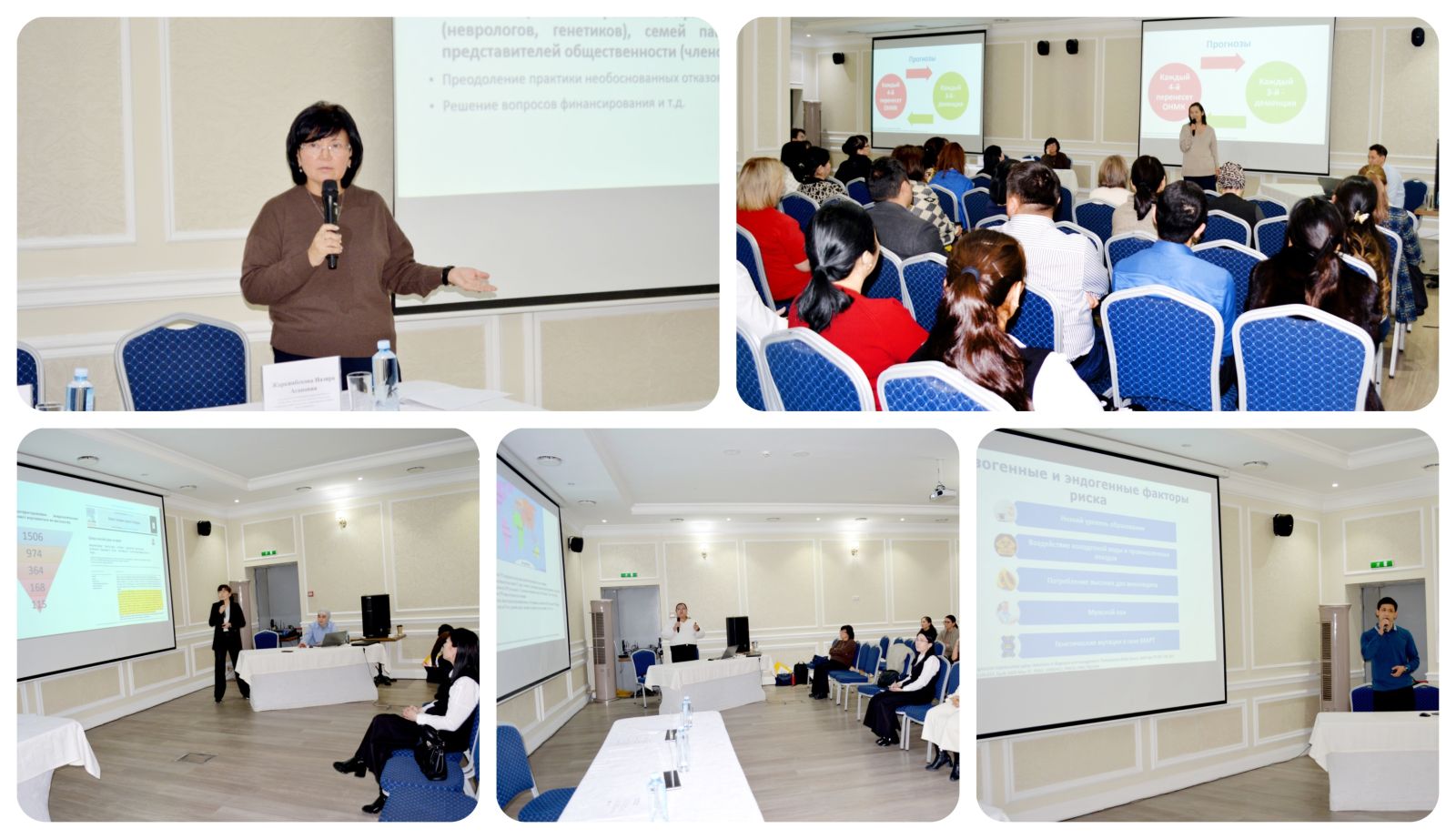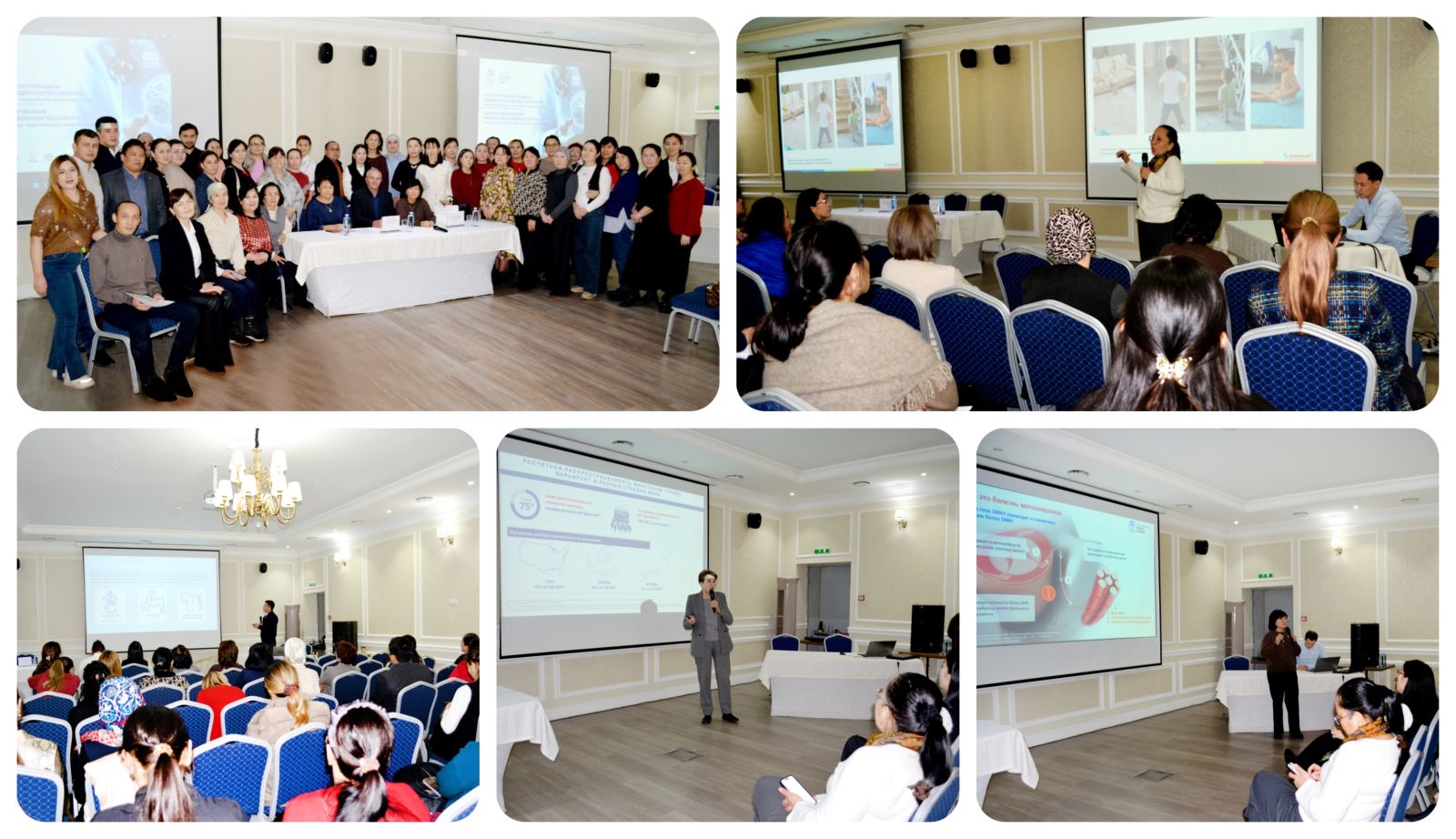Multidisciplinary Approach in the treatment of nervous diseases and the effectiveness of therapy in specific laboratory studies

On February 5, 2025, in Shymkent, the Regional Scientific and Practical Conference «School of clinical neurology in Southern Kazakhstan» took place. The conference was organized by the Association of Neurologists of Southern Kazakhstan, the Department of neurology, psychiatry, and psychology of the South Kazakhstan Medical Academy, with the support of the Health Departments of the Turkestan region and Shymkent city.
Opening the regional scientific and practical conference, the Chairperson of the «Association of Neurologists of Southern Kazakhstan», Head of the Department of neurology, psychiatry, rehabilitation, and neurosurgery of the South Kazakhstan Medical Academy, c.m.s., professor Nazira Asanovna Zharkinbekova, emphasized the importance of the conference not only for neurologists from polyclinics and healthcare organizations in the Turkestan region, the cities of Taraz and Shymkent, but also for second-year residents of the South Kazakhstan Medical Academy and doctoral students of the IKTU named after Yassawi in Turkestan.
Leading scientists from Kazakhstan presented reports to the conference participants. For example, Assistant Professor of the Department of Neurology at KRMU, neurologist consultant at the DGKB No. 2, and coordinator for NMSU in the Health Department of Almaty, Bakhyt Dzhusupjanovna Myrzalieva, acquainted the participants with modern diagnostic methods for spinal muscular atrophy, from genetic testing to clinical assessment. PhD, Director of the Center for Neurosis Treatment and Alzheimer's Disease in Almaty, Zhibek Alillulaevna Zholdasova, shared diagnostic algorithms and the organization of care for patients with Alzheimer's disease.
“Diagnosis and treatment of orphan diseases is one of the priority areas of neurology. It is important to provide timely assistance and recognize these diseases. Schools of Neurology play a key role in assisting specialists on the ground, and today's event is no exception,” said N.A. Zharkinbekova, who gave reports on “Multidisciplinary Approach in Treating SMA Patients: Collaboration Between Specialists,” “Optic Neuromyelitis Spectrum Diseases. Differential Diagnosis of ONMS and MS,” and “The Benefits of Induction Approach in Multiple Sclerosis Therapy.”
“In 2017, the Department of Neurology of the South Kazakhstan Medical Academy signed a scientific cooperation agreement with the Institute of Neurology at University College London as part of the international SYNaPS project, aimed at studying the genetics of rare paroxysmal neurological diseases. The initiative came not only from the department but also from Rawan Bagdanovich Kairzhanov, MD, PhD, Associate Professor of the Department of Neurology of the South Kazakhstan Medical Academy, researcher at the Institute of Neurology at University College London. Over the past 5 years, we have identified exact molecular-genetic causes of diseases, which has improved treatment and, in some cases, completely cured diseases using drugs available in Kazakhstan. This project has contributed to the development of national clinical protocols for the diagnosis and treatment of these diseases, which has significantly improved the quality of medical care in Kazakhstan,” concluded Professor N.A. Zharkinbekova.
Regarding myasthenia gravis and choosing the optimal therapy methods, as well as anxiety-depressive disorders in clinical neurology practice, PhD, Associate Professor of the Department of Neurology, Psychiatry, Rehabilitation, and Neurosurgery of the South Kazakhstan Medical Academy, Gulfariza Usenovna Tuksanbaeva, presented a report.
Dr. PhD, acting Associate Professor of the Department of Neurology, Psychiatry, Rehabilitation, and Neurosurgery of the South Kazakhstan Medical Academy, Tatyana Vasilyevna Polukchi, highlighted cognitive dysfunctions in chronic viral hepatitis.

The platform was also provided for neurologists, residents, and doctoral students of medical universities, who demonstrated the effectiveness of therapy based on specific laboratory studies and MRI scans of both the brain and spinal cord, identifying diseases at the molecular genetic level: Erkhodzhayeva Nigara, neurologist, doctoral student at MKTU named after H.A. Yasawi in Turkestan, Kazakhstan (Algorithm for diagnosing complex neurological phenotypes); Residents of the Department of Neurology, Psychiatry, Rehabilitation, and Neurosurgery of the South Kazakhstan Medical Academy: Baurzhan Eldar (Funicular myelosis: the journey from the stomach to the spinal cord);Kalzhan Olzhas (Progressive supranuclear palsy: description of a rare case in medical practice);Bazarova Aigerim (Clinical case of "stiff person" syndrome); Abdumonimova Nigora (Dynamics of strokes in the Turkestan region over the last 5 years);Mombekov Nurlybek - 1st-year doctoral student at IKTU named after H.A. Yasawi in Turkestan (Epidemiology of epilepsy in the Turkestan region today);Baymakhanova Gulzira - 1st-year doctoral student at IKTU named after H.A. Yasawi in Turkestan (The role of genetic factors in the development of familial forms of epilepsy) and others.
The Regional Scientific and Practical Conference "School of Clinical Neurology in Southern Kazakhstan" is the first event of the year organized by the Association of Neurologists of Southern Kazakhstan and the Department of neurology, psychiatry, and psychology of the South Kazakhstan Medical Academy. The association includes not only neurologists from the Turkestan region and Shymkent but also from Taraz. Soon, the association's website will be launched, where not only normative acts, laws, and grant projects will be published but also extended information, presentations from the speakers of this conference, announcements, and contact details. The website will feature materials about neurologists from regional areas who work diligently in cities and remote villages. This will provide a new impetus for the delivery of high-quality medical care to the population,” concluded the work of the scientific conference, Professor N.A. Zharkinbekova.
 552 views
552 views
